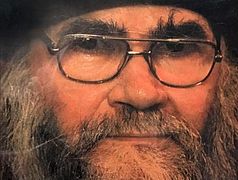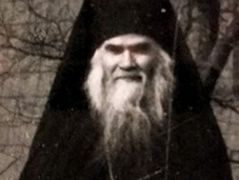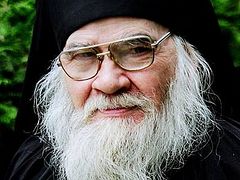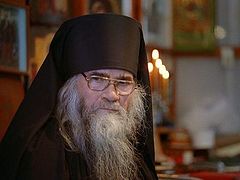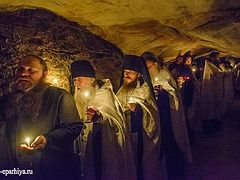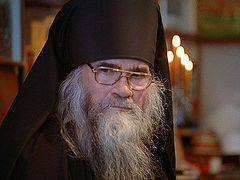These vignettes by Fr. Adrian’s spiritual daughter Nina Pavlova, also well known as the author of Red Pascha, a book about the three Optina monks murdered by satanists in 1993, wonderfully describe a day in the life of Fr. Adrian and his spiritual children in Pechory. It’s a picture of heaven and earth meeting at the elder’s blessing…
“Return your ticket”
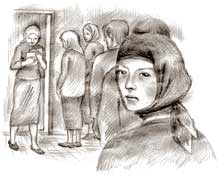
“They could have been to the forest and back with their berries a long time ago,” one pilgrimess from Moscow sneers. “Soon they’ll be asking, “Batuishka bless me to sneeze!’”
But if berry picking basically perplexes everyone, then the young Lidochka (diminutive of Lydia) from St. Petersburg gets the full treatment. First of all, Lidia went straight to Fr. Adrian without standing in line, because batiushka blessed her to. Secondly, she has an appointment for a full life confession, beginning from age seven— you can imagine that that takes a long time. Through the cell window we could see Lidochka taking a thick notebook out of her purse, digging through it with tears and beginning to read. She read it for forty minutes. She has finally folded the notebook closed and batiushka has placed the epitrachelion on her head when the girl takes out a second notebook… then a third, and a fourth. Or is it the fifth?
“I have to leave, and she’s still sitting there!” a pilgrim from Vladivostok said nervously.
Finally Lidia came out of the cell, but then she goes back in. “Ay batiushka, I forgot to ask…”
And batiushka again starts talking with the penitent, affectionately calling her “Lidochka”.
“Lidochka! Lidochka!” explodes Katya the beauty with indignation. “She hasn’t been a year with batiushka and she’s already ‘Lidochka!’”
It’s obvious that Katya is jealous of Lidia over batiushka. Here’s Katya’s story: six years ago she left her fiancé and came to the elder, demanding that he tonsure her a nun. Katya spends all her days in podvigs. For example, this last Great Lent she ate like a rabbit, nothing but cabbage leaves, incidentally inviting me to join her. I declined, excusing myself for my weakness.
“Well, if you can’t do such a little thing,” Katya said to me arrogantly, “then what good will ever come of you?”
True, unlike a rabbit Katya detested cabbage after this. All the more upsetting that batiushka doesn’t take notice of Katya’s podvigs and doesn’t bless her to be tonsured a nun. To fast forward, I’ll say that when ten years later I asked my friends whether batiushka had tonsured Katya, they replied, “No tonsure. But Katya is our iron lady, she says, “I’ll get what I want.”
Katya is not the only one who comes to the elder to get what she wants. Batiushka’s opinion does not interest such people, because the elder is simply obligated to bless someone’s absurd idea, fantasy, or self-deception. As a result they take what they want to be a foregone conclusion; and there is only one fact, but it’s well known. Several years ago, supposedly at Fr. Adrian’s blessing, there was an organized act of nationwide repentance for the murder of the tsar (Nicholas II). Women stood with petitions outside churches persuading the parishioners to sign, “otherwise Russia can’t be saved.”
For the sake of Russia’s salvation many signed, but then one monk said, “Forgive me, but I was with Fr. Adrian yesterday and I asked him about this petition. Batiushka answered, “Could I really have blessed such stupidity? We need to repent of our personal sins, but there is no repentance for other people’s sins in Orthodoxy.”
“But we thought…” the woman were embarrassed.
Well, as St. Nektary of Optina said, “Stop ‘thinking’ and start contemplating.”
* * *
Finally Lidia leaves batiushka, and now the line is moving quickly. Really, monks are glorious folk, and out of love for the elder they don’t waste his time over trifles—they go in, briefly express their needs and leave, having received a blessing.
“Maybe we’ll even get in,” the elderly pilgrimesses from Moscow rejoice. “We only need a minute with Alyoshenka[1], to give him some treats. After all, he’s our factory man—from the Lichachev automobile factory.[2]
The old ladies remember the elder when he was still young, and call him by his former name, Alyosha. And apparently Alyosha was so good-looking that not a few girls had crushes on him.
“We would invite Alyosha to the dances,” the Moscow ladies tell us, “but after work he would only go to church. We took offense, lovelorn fools, and decided that since he could “spit on” the girls, then we’ll spit in his jar of holy water. We snuck into his dormitory room and spat, but after that we all got sick. A temperature of forty degrees Celsius, suffering to death, couldn’t lift our heads from the pillows. We were sick and suffering and we finally guessed—it was a punishment for our sin. We wrote a note to Alyosha asking forgiveness and that he pray for us. And at his prayers we were healed in a moment—and what is most important we came to God. From that time on we haven’t stopped following batiushka by a single step! First he served in the Holy Trinity-St. Sergius Lavra, and our whole families would go to see him. Before the first of September we would always bring our children to him. Batiushka would pray for the schoolchildren, bless the little kids, and you could see how the children would study diligently, always respecting their elders and teachers. With batiushka’s prayers, we’ve never known any troubles. But then persecutions started against the elder, and the party authorities were determined to remove him from the Lavra within twenty-four hours.
* * *
But before we talk about persecutions against the elder, I’ll cite several facts that characterize the spiritual atmosphere of those times. Archpriest Valery from Kozelsk related how difficult it was during those years to enter a seminary. The future priest would be immediately dragged into the KGB, where they would promise to show him the sky through barred windows if he doesn’t recant on his intentions. Then the police would take up where the KGB left off—they would seize the applicant at the train station and hold him for several days so that he would miss the examinations and not get into the seminary. Well, the seminarians had there own tactics: A month before the exams they would leave their homes and hide in the woods near the Holy Trinity-St. Sergius Lavra [where the seminary was located.—Trans.] On the day they were supposed to submit their documents they would send a lookout ahead, and at his signal that “the road is clear” they would quickly run to the monastery in order to hand their documents over to the acceptance committee before the police could catch them. Only then could they feel relatively safe, because officially there was no persecution against religion in the USSR. The authorities would also invite foreigners to show them that the churches were open, and students were studying in the seminaries.
After graduating from seminary, Fr. Valery was invited to work in the opera theater, because he was endowed with a wonderful voice. But he wanted to be a priest; however the authorities refused to register him at a parish. Batiushka was without work for three years. There was also Igumen Peter (Barabash), a prisoner for Christ who had refused to give the KGB information he heard at confessions and had to wash the lavatories in train stations because at the KGB’s orders no one would hire him anywhere else.
In a word, whatever they may say about priests who served under the soviet regime and supposedly “sold themselves to the KGB,” this was after all a martyric path. During those years, as Archimandrite Adrian once told me, he was sleeping with a skull under his head in order to get himself used to thoughts of death and the inevitability of suffering for Christ. And the Lord gave His confessor the gift of eldership—the gift of clairvoyance, the gift helping the sick, and fiery prayer that scorched the demons. In the Holy Trinity-St. Sergius Lavra, Fr. Adrian had the obedience of exorcising demoniacs. Many were healed, and not only at the exorcisms. People who it seemed were condemned to being invalids all their lives would later work as teachers in nursery schools, doctors in clinics, and skilled workers. One active Communist Party member, after being healed, slapped his party ID onto the regional commissar’s desk and openly confessed Christ. All of this made the plenipotentiary for religious affairs very angry—and not only him.
I remember how one bishop complained about Fr. Adrian at the Pskov Caves Monastery:
“I walk around the monastery and everywhere it’s quiet, blessed, and beautiful. But as soon as you come out of Fr. Adrian’s cell you see a scandal brewing—someone is screeching, barking, or snorting. You’ve seen this outrage yourselves! After all, foreigners come to the monastery…”
Foreigners would come to the Holy Trinity-St. Sergius Lavra especially often. They were brought there to be persuaded that there is no persecution of religion in the USSR, and true were the words of the soviet song: “I know no other country were man breathes so freely.” And it was interesting for foreigners to have a look at these stone-age people who still believe in God and even walk around in bast shoes. Well, one day a delegation came to the Lavra to look at the monks as at museum exhibitions when suddenly Fr. Adrian, a confessor of the Living God and demon-expeller, came out of his cell. He simply passed by, without a word. But the leader of the group unexpectedly began screeching and snorting like a pig, and without knowing a word of Russian began swearing like a truck driver, saying, “Pop[3] Adrian, I’ll kill you! Kill the pop!”[4]
There was a serious scandal. A certain head of the central commission of the Communist Party of the Soviet Union ordered angrily that “Adrian be sent away from the Lavra in twenty-four hours, and so that he not step foot there again!” Officially it was called: Transfer Fr. Adrian to the Pskov Caves Monastery. Batiushka was sick that day, but they didn’t even give him enough time to gather his belongings. Meanwhile a crowd ran after him to the train, asking him questions and begging him for help.
That is how it always was: The elder had no peace even when he was sick. One day some women from Moscow brought the dying Nina to the sick elder. She had fourth stage cancer that was considered incurable, and the doctors told her she would die soon. Nina was far from the Church at the time, and they had brought her to the elder in despair.
“I’m dying, batiushka,” she cried. “I’ll die soon!”
“Well, get ready for death, Nina,” the elder advised her.
Probably thirty years have passed since that day and Nina is still getting ready for death. They say that she is now a nun, secretly tonsured, and a real ascetic for Christ. Only the words of the holy fathers can explain Nina’s ongoing life: “Death never seizes the man who is striving for perfection.”
* * *
As the years went by the elder would become ill more often. So now the rumors are passing through the waiting line that batiushka has a fever again, and the doctor has forbidden him to continue receiving people. The people in the line are beginning to worry, and the anxiety increases when Lidochka appears again and asks that they let her in to see the elder “for a second.”
“Over my dead body!” Katya says as she lunges into Lidia’s path.
“We’ve come from Siberia to the elder and we can’t get in. And you?” the Siberians huff.
But Lidochka won’t let up and knocks at the cell window. “Batushka, my own, they won’t let me in to see you!”
“What do you need, Lidochka?” Fr. Adrian says as he walks outside.
“Batiushka, I just bought a bus ticket but I hadn’t asked for your blessing to travel.”
“Return the bus ticket. You’ll take the train.”
“But I can’t take the train,” Lidochka says frantically. “The train arrives at 11:00 in the morning, and I’ll be late for work! My boss will eat me alive, and…”
“You’ll take the train,” batiushka cuts the discussion short and turns to the local women to bless them to pick berries.
I’ll tell you more about berry picking later, but first about Lidochka. She did in fact take the train, trusting like a child the experience of the holy fathers that says, “Do as the abba blesses.” And how good it was that she had that trust, because on the next morning came the terrible news: A drunken truck driver had crashed into the very bus that Lidia had bought a ticket for, and there was much bloodshed and many victims.
“I’ll receive only those who are leaving tomorrow,” Fr. Adrian announces on the porch, for some reason inviting me into the cell…
At the Sea of Tiberias
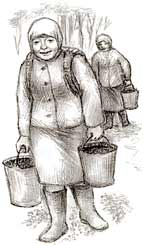
“We never go to the forest without batiushka’s blessing, the women tell me. “And when batiushka prays and blesses us we do our work without getting tired and we make a good living.”
Once I asked one of the women to take me with her to the forest. From August 15, as the radio announced, it is allowed to pick lingonberries and we set off to pick them. True, the women warned me right off that the first pick is not for them but for God, as they give it all to the monastery. Father cellarer also sent four pilgrims, headed by Katya, with us to pick mushrooms, because it’s the Dormition fast and mushrooms are much needed.
On the edge of the forest everyone is praying, and the oldest, Valentine, is reading a prayer to the holy hieromartyr Charalampios, a great sufferer, to whom the Lord appeared before his execution and said, “Ask Me what you want, and I will give it to you.” The aged bishop (he was 113 years old) began to pray to the Lord for people who “are flesh and blood,” that the Lord grant them in memory of his sufferings an abundance of the fruits of the earth, so that people would be filled and glorify God.
And on that day we were granted such an abundance of earthly fruits that I can’t even describe it. I wandered into the first lingonberry field and gasped with amazement—the entire field was so thickly carpeted with berries that you couldn’t see the earth. The lingberries were large like cherries, and growing in clusters. You could pick them not one berry at a time but by handfuls. I quickly gathered a bucketful and went to find the pilgrims to help them gather mushrooms.
But there I beheld a wonder of wonders. In a young spruce grove were flanks of firm, handsome white mushrooms, and the green moss was laden with saffron milk caps. All of the baskets were already full. But is it possible to leave such bounty? We take off our aprons, scarves and sweaters and bundle up the mushrooms. Finally the women return from the lingonberry fields, each with two buckets of berries, with full bags of berries on their backs. They are professionals; they gather them with both hands, quickly and nimbly.
We rest on the forest edge and snack on bread and tomatoes, admiring all the while those marvelous, large berries.
“I’ve never seen such beautiful lingonberries in my life,” I muse.
“I have to say I’ve never noticed that lingonberries are beautiful,” admits one experienced berry picker named Marina.
“Why haven’t you noticed?”
“How can I explain it? My husband has been out of work since the spring, and we have three children. I’m not gathering berries but counting money—a hundred here, fifty there. I rush around and don’t see anything around me. But today I’m picking them for free, and my spirit is enraptured with the beauty of it. Lord, I think, I’m so happy. Glory to Thee, O Lord, glory to Thee!”
“It’s true, it’s like a holiday today,” says Valentina and instructs me: “Definitely take your first cucumbers and tomatoes to the church. And believe me, you’ll always have a harvest.”
“You mean give the Lord a ruble so that you can receive a hundred in return?” Katya the beauty reproaches Valya. “But that’s mercenary deal-making with God!”
“What deal-making are you talking about? I don’t understand,” Valentine says, perplexed.
But it seems to me that I understand her. Behind the custom of bringing the first harvest to church stands the Christian habit of consecrating one’s household and placing God first, and not one’s gain and prideful “me”.
Marina rises to defend Valya, who was just rebuked for filthy lucre. “Listen, Katyusha, and I’ll tell you about my brother. He used to work on a fishing crew. The fishermen had a custom of dedicating the first catch to God, taking the fish to the monastery and the children’s home. And that first catch was like the one at the Sea of Tiberias, when only a miracle kept the nets from breaking because of the multitude of fishes. We would meet the fisherman on the shore and they would be shouting for joy, “God’s catch! God’s catch!” The fishing would be excellent throughout the season. But then some wealthy man bought their fishing business and told the fishermen, “I won’t allow you to give away fish for free. Our aim is to make a profit. And what does God or “God’s catch” have to do with anything?” But without God the fish stopped being caught. The rich man went bankrupt and the crew disbanded. Do I make myself clear, Katya?
“Couldn’t be clearer!” Katya sneers. “Give God a bribe to receive capital!”
“I’ll say it even more clearly,” Marina continues unperturbed. “We truly live by the Sea of Tiberias, but we don’t want to live according to God’s will, we don’t obey batiushka and only try to get what we want. And then it happens to us as it did for those fishermen who fished all night, wore themselves out but didn’t catch anything. You can bust your forehead making prostrations but nothing will come of it if it’s not God’s will. Do you understand me, Katya? Eh?”
Katya turns away and everyone understands what Marina is talking about. Katya is not of monastic bent, but imagined herself a nun one day and has been floundering like a fish on ice ever since. She rebukes everyone, quarrels and lives on her parents’ money, placing herself higher than anything else in the world. But no one gets offended at Katya, because they understand that she’s unhappy.
And I also remember the story of one unhappy geologist. He spent two years trying to get into the geological institute only to understand upon graduation that he had confused geology with tourism. And how much such such confusion there is in the world! In the words of one American scientist, mankind lives in reality only five percent of the time, and ninety-five percent in illusions. Sooner or later the illusions crumble and unhappiness becomes the lot of dreamers who build their houses upon sand…
But today is a feast day on our Sea of Tiberias. It’s as if we had spent some time in paradise, relishing the beauty and marveling at the abundance of God’s harvest. We have no desire to leave the woods, but Valentina is hoisting her bag onto her back with the words, “We’ve had a rest, and it’s enough. Time to go, sisters.”


